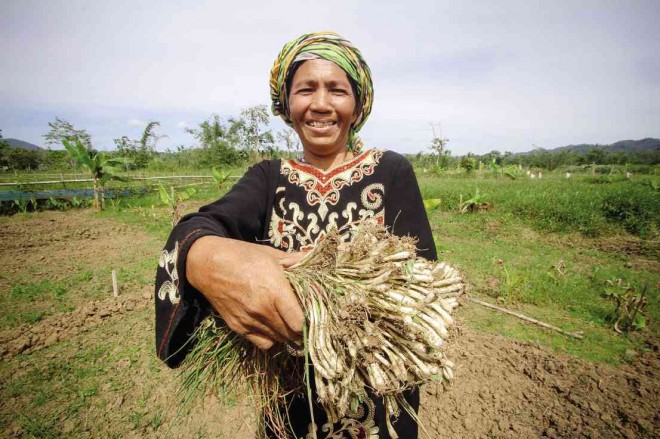A meal in a Maranao household in Lanao del Sur province is not really complete without the tasty and spicy “palapa,” an appetizer that according to tradition, should be prepared with love using “sakurab,” or white scallions, ginger and chili.
Sakurab is sold in almost every street and alley in the province—proof that the palapa’s existence is intertwined with the history and culture of the people of the lake.
The culinary ingredient is more than that for the women of Barangay Batangan in the placid town of Bubong; it is also fuel for economic stability.
Potra Hadji Karim, 45, has turned to planting sakurab as her main source of income after her husband died while working in Manila and left her to provide for their six children.
“We were not able to see him because he was buried there. It was really hard for my children and me. But we saw that our humble sakurab would help provide food on our tables,” Karim said.
Her day starts before daylight breaks, heating water for coffee and cooking rice for the children. She would then proceed to their small farm and take care of their crops.
House, farm tasks
“I would return to our house before lunchtime, just moments before the sun would be extremely hot. From farm work, I would now tend to my household chores,” Karim said.
“It is not that hard actually. And the routine is bringing relatively enough money for us,” she said.
The woman noted the huge demand for sakurab and the plant’s adaptability to varying weather conditions. “Sometimes it rains so hard that the fields are flooded and sometimes it is so hot that the soil dries up,” Karim said.
Bubong, which is located at the foot of the mountain range of Lanao del Sur, is frequently flooded.
“The sakurab has no problems with that,” Karim said. “It just grows and grows until we can harvest it and sell it.”
Synthetic fertilizers are not needed as indigenous and organic concoctions are enough, she added.
Challenges
However, just like the rest of the agriculture sector, sakurab farming has also its challenges.
With the assistance of the Lanao-based Al-Mujadilah Development Foundation (AMDF) and the international organization Oxfam, the women of Bubong have found ways to improve their lot.
The AMDF seeks to promote women’s rights, good governance and peace building toward gender-fair, humane and sustainable communities. As a women’s organization, it has realized that sustainable livelihood is the response to the recurring problems of women in the localities.
“There is not just an increase in their income but also in the role and participation of the women in the communities. They said their influence had also increased with their money contribution in the family,” said Zahria Mapandi, the foundation’s executive director.
Economic participation has further developed women’s grassroots organizations and has shown that women are capable of economic leadership, the AMDF said.
Male-centered
The women of Bubong decided on sakurab farming because it is manageable, considering that most of them also do household chores, Mapandi explained. The AMDF also supports the production of peanut, sweet pepper, sweet potato and other vegetables in other areas of Lanao del Sur.
Mapandi said the women’s involvement in agricultural activities had also changed practices that had been considered gender-insensitive and male-centered. For example, the women are usually prohibited from leaving their community if a male person does not accompany them, she said.
“This limits marketing and productivity so with our program, we are trying to change this dynamic with the women in our communities,” Mapandi said.
Lyca Therese Sarenas, Oxfam manager for gender mainstreaming and women’s rights, praised the initiative as a “way of demonstrating that if we put the productive resources in the hands of women, by providing them access to markets and by shifting people’s attitudes and beliefs toward equal relations between men and women in household decision making, we will be able to achieve a more inclusive and sustainable growth and well-being.”
‘Palapa’ love
Karim said producing sakurab was no longer about providing for the needs of the family but also about breaking the view that the women sector was considered only reproductive and not productive.
“Gone are the days when we were looked down on as weak members of the community. We can pick the shovel and till the land. We can harvest and cook our produce. We can sell it on the streets, in the market and even from house to house,” she said.
“This does not mean that we are insulting the men. Even if we are now working, every Maranao woman still equally loves her husband just like how they pour their hearts out in cooking our spicy yet sweet palapa,” Karim said.
At the end of the day, after they put down their shovels, it is still about respect and cooperation, she added.
Even if her husband is gone, Karim said, every sakurab that she planted reminded her of the dedication and promise that she would give their children a better future.
